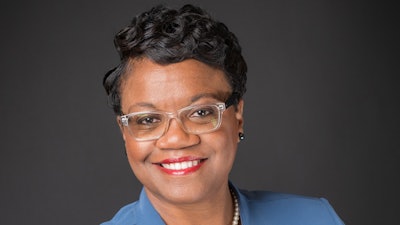In the intricate tapestry of higher education, where the threads of diversity, equity, and inclusion are meant to weave a fabric of progress and opportunity, we find ourselves confronting a perplexing paradox. The paradox of the words that are symbols of hope versus the actions that are symbols of hatred. Why have these once laudable ideals of diversity, equity and inclusion become tarnished, whispered about in hushed tones, even deemed "naughty words" in some circles of the academy and government?
Since the inception of community colleges, the vision of open access, seamless transfer pathways, and the elevation of educational standards for all segments of society have remained a beacon of hope. Yet despite the purported openness and opportunities, glaring inequities persist in educational attainment and workforce placement, particularly for students of color. Privileges abound for some, while barriers loom large for others.
 Dr. Kimberly Beatty
Dr. Kimberly Beatty
The Civil Rights Act of 1964 stands as a testament to the struggle for equality, outlawing discrimination, and opening doors for people of color to work, learn, and dream freely. Yet, here we are, in the year 2024, witnessing political leaders across the nation chipping away at the very foundations laid by this pivotal legislation. The principles enshrined within the Civil Rights Act are under siege, and the battle for equity rages on.
On college campuses, the bastions of intellectual inquiry and societal progress, the concept of academic freedom should reign supreme. Yet, faculty members who dare to champion diversity, equity, and inclusion initiatives find themselves under attack. Their efforts to nurture the next generation of leaders for a democratic society are met with resistance and scorn.
The research, pedagogy, and educational practices and programs aimed at fostering a more inclusive and equitable society are being sidelined, dismissed as frivolous or unnecessary. How many steps backward must we take before we can march forward toward a more united future?
Even staff members who have spearheaded transformative equity efforts on college campuses are finding themselves out of a job; their commitment to diversity and equitable outcomes deemed expendable in the eyes of some. The irony is horrific: professionals are losing their livelihoods precisely because their endeavors have led to greater competency, inclusivity, and fairness within their institutions.
But the assault on diversity, equity, and inclusion doesn't stop there. In some states, these principles are being criminalized, further eroding the protections of academic freedom. Regional accreditation bodies, once allies in the pursuit of educational excellence, are hamstrung by state laws that undermine their authority and effectiveness.
 Dr. Merrill Irving Jr.
Dr. Merrill Irving Jr.
The question that hangs in the air is this: what isn't considered offensive these days? The voices of people of color, historically marginalized and silenced or drowned out by the clamor of the dominant majority. And when those in power take offense, consequences swiftly follow as seen in many recent, public cases.
As a “nation of the free,” we must continue our brave pursuit of diversity, equity, and inclusion. College CEOs must take time to educate their boards on the importance of diversity, equity, and inclusion to enrollment, retention, and most importantly success of students. State higher education boards must brave the challenge of state governing bodies to speak up for all, not just some. Faculty must have the academic freedom to teach the elements of America’s beautiful, but sometimes, shameful tapestry—it is all important! Staff must be able to provide equitable support for students who don’t come to college with the same worldview of higher education nor the resources for success.
In this climate of uncertainty and hostility, it is imperative that we reaffirm our commitment to the principles of diversity, equity, and inclusion. These are not mere buzzwords to be discarded at whim; they are the very pillars upon which a just and equitable society is built.
It is time for higher education to reclaim its role as a beacon of progress, a bastion of enlightenment, and a champion of diversity in all its forms. Only then can we hope to transcend the divisions that threaten to tear us apart and forge a future where every voice is heard, and every individual is valued.
America has one of the greatest higher education systems in the world; let’s make it one that supports all, no matter their race, sexual orientation, political affiliation, or socio-economic background. Let us continue our quest for those who are often scorned and disadvantaged in our society. As stated by Jesse Jackson, “Inclusion is not about political correctness, it’s the key to growth.” Let us continue to grow in the academy and as a country.
Dr. Kimberly Beatty is the chancellor for Metropolitan Community College in Kansas City.
Dr. Merrill Irving Jr., is the senior executive of advisory services at Ferrilli a Higher Education Consulting firm.


















